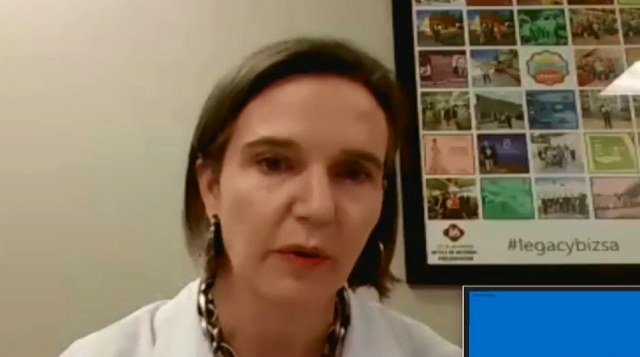Health Transition Team indicates Friday may be too soon to reopen

SAN ANTONIO (KTSA News) – The COVID-19 Health Transition Team offering guidance to San Antonio Mayor Ron Nirenberg and Bexar County Judge Nelson Wolff on reopening local businesses has released a set of indicators that suggest it’s too early.
Dr. Barbara Taylor, who’s leading the team, released the report containing “cautious and data-driven steps towards reopening” Tuesday before a rare joint session of San Antonio City Council and Bexar County Commissioners.
The first indicator is a sustained decline in the percentage number of new cases of COVID-19 over 14 days. The second indicator is the capacity to test all symptomatic residents and their close contacts, as well as those in public-facing roles.
“There’s been a lot of focus, as was mentioned earlier, on healthcare workers, but we also have to think of other public-facing folks–people who work in shelters or people who work in grocery stores. They are also at risk,” said Taylor.
The third indicator is contact tracing, which involves tracking and monitoring contacts of infected people and helping to ensure the safe and effective quarantine of those contacts to prevent the spread of COVID-19. The Health Transition Team recommends increasing the number of contact tracing investigators from 17 to 175. Taylor notes that 70 trained volunteers from local medical and public health schools currently are helping out.
The final indicator is a prepared health care system. Tuesday, 38 percent of hospital beds and 77 percent of ventilators were available.
“Reopening our economy is not without risk,” said Dr. Barbara Taylor, team chair. “In order to avoid a resurgence of COVID-19 in our community, we must be diligent, look out for members of our community who are most at risk, and remember that we are all in this together.”
Taylor also presented warning signs, which local officials should watch for after the reopening as they try to determine whether to pull back or shut things down again.
“As we reopen, it is very important for us to know when things are headed in the wrong direction, to anticipate that and to respond appropriately,” said Taylor.
The first is a decrease in the number of days it takes for COVID-19 cases to double. That’s an indication of how quickly cases are rising, which is referred to as “doubling time.”
The second is an increase in the percentage of tests that show an active infection.
“This is a percent positive of all the tests being run,” said Taylor. “If that starts going up, then we know we’re headed in the wrong direction.”
The third and final warning indicator is health system stress.
“Any reduction in availability of Personal Protective Equipment (PPE), hospital beds or ventilator capacity or an increase in EMS calls could be indications that we’re headed in the wrong direction,” said Taylor.
The recommendations also take into account those who are medically at risk, as well as low-income communities, communities of color, and other marginalized communities.
Taylor presented the report to the San Antonio City Council and Bexar County Commissioners in a rare joint session Tuesday afternoon.
Wolff said that he and Nirenberg will meet with attorneys as they try to determine what they can do to strengthen the Public Health Emergency orders handed down by Governor Greg Abbott. They’ll have to move fast because the current Stay Home Work Safe orders are set to expire Thursday.
“As we go forward, it’s going to be extremely important that we have a good relationship with the employers and they institute the right things in their business to protect their customers and to protect their employees,” said Wolff.
Nirenberg said they’ll be moving forward with a mix of state and local guidance, “some of which we do not have control over.”
He says the success of being able to slow the spread of the virus has depended on the community.
“Each individual action to stay at home, wear a mask, and do the things that are necessary to protect your family and those around you has been critical to our success,” said Nirenberg. It is our job to provide the data and information in a timely and transparent manner so people can make those informed decision.”
Councilwoman Ana Sandoval, chair of the Community Health and Equity Committee, served as City Council’s liaison to the health transition team. Commissioner Justin Rodriguez served as the liaison for Commissioners Court.
Team members include Dr. Dawn Emerick, City of San Antonio Metro Health Director; Dr. Junda Woo, City of San Antonio Metro Health Medical Director; Dr. Ruth Berggren, UT Health San Antonio infectious disease specialist; Dr. Bryan Alsip, University Health System Chief Medical Officer; Dr. Cherise Rohr-Allegrini, public health consultant; Dr. Tom Patterson, Chair of Infectious Disease, UT Health Science Center; Dr. Carrie DeWitt, group manager and infectious disease physician; Dr. Sharon Ong’uti, UT Health San Antonio Fellow; Dr. Amelie G. Ramirez, UT Health San Antonio; Dr. Kenneth R. Kemp, Pulmonary and Critical Care Medicine and Pastor Antioch Missionary Baptist Church; Zan Gibbs, City of San Antonio Office of Equity Director; Rita Espinoza, City of San Antonio Metro Health; Michele Durham, BEAT AIDS Coalition Trust, and Dr. Jason Morrow, Medical Director of Inpatient Palliative Care Services at University Health System.
You Might Also Like



